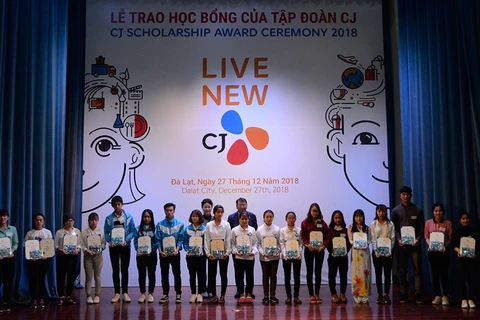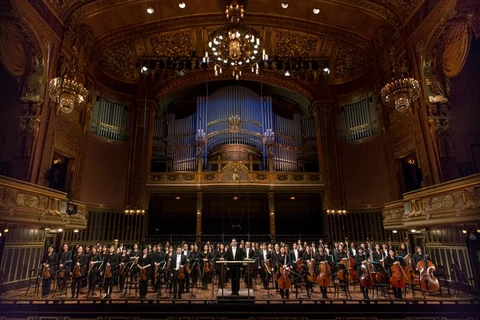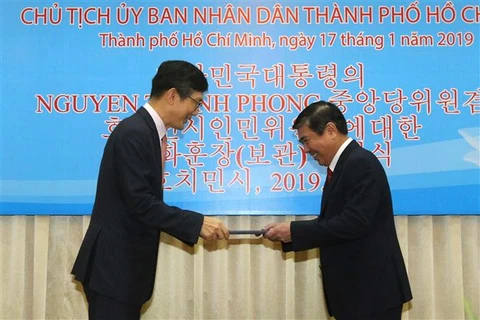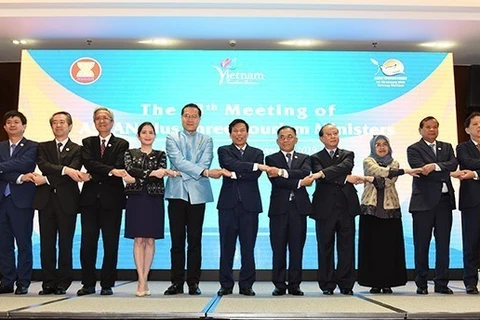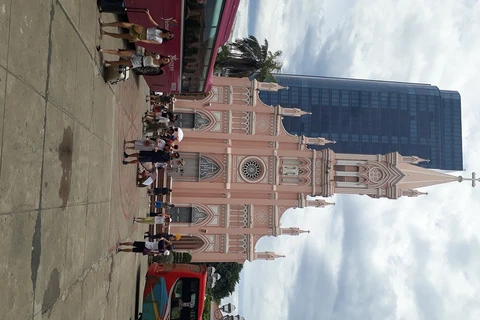Lam Dong (VNA) – Choi Young-sook, a Korean woman in her 60s with a doctorate degree in audiology, has been dedicating her time to students with disabilities in Da Lat city in the Central Highland province of Lam Dong over the past eight years.
Choi has many years experience in teaching hearing-impaired students at Pusan Kuhaw school in the Republic of Korea (RoK). Previously, as a lecturer at the INJE University in Gyeognam province, she decided to retire early to focus on special education in Vietnam.
Ahead of the Tet (Lunar New Year) festival, Vietnam News Agency (VNA)’s reporter had an opportunity to talk with Choi at Lang Café – a community venue for children who are hard of hearing, set up by her and Lam Dong School for the Hearing Impaired.
Choi shared with the reporter some of the latest developments in special education in the RoK and suggested what Vietnam should do to reform its education system towards being more inclusive.
She first visited Lam Dong School for the Hearing Impaired in 2005. After becoming more familiar with the school and highlighting some of its shortcomings, Choi decided to offer her hand to overcome these barriers.
Over the past eight years, Choi and her partners have carried out many activities to help children with disabilities.
Korean special education experts have been travelling to Vietnam to conduct training courses for teachers, Choi said. She has introduced 25 experts from the Korean Wonmyeong Daejeon University to Da Lat, thus far training 80 teachers. In August 2018, 13 special education experts from the RoK held training courses in this field in Vietnam with the participation of 35 schools in the southern region of Vietnam.
Along with education, the Lam Dong School for the Hearing Impaired and the Lam Dong Blind Association have provided music and physical education classes for secondary school students.
Choi said she feels very happy in doing her work, with herself and her spouse often taking part in social activities with the provincial Red Cross Society.
So far, she has called on donators to coordinate with the provincial Red Cross Society to build 13 houses for people with disabilities, as well as buy 269 wheelchairs and over 400 bicycles for poor and ethnic minority students.
“My biggest desire in the future is to establish a development centre for children with disabilities so that they can receive appropriate education even before the age of three,” she said.
Choi added that in Vietnam, the detection and education of disabled children remains slow, especially as most children do not go to school until the age of six. Children with congenital disabilities, if found early before the age of three, are likely to overcome their disabilities through early special education, Choi said.
“With my efforts and the assistance of Korean and Vietnamese donors, I hope the special education system in Vietnam can be improved,” she added.–VNA
Choi has many years experience in teaching hearing-impaired students at Pusan Kuhaw school in the Republic of Korea (RoK). Previously, as a lecturer at the INJE University in Gyeognam province, she decided to retire early to focus on special education in Vietnam.
Ahead of the Tet (Lunar New Year) festival, Vietnam News Agency (VNA)’s reporter had an opportunity to talk with Choi at Lang Café – a community venue for children who are hard of hearing, set up by her and Lam Dong School for the Hearing Impaired.
Choi shared with the reporter some of the latest developments in special education in the RoK and suggested what Vietnam should do to reform its education system towards being more inclusive.
She first visited Lam Dong School for the Hearing Impaired in 2005. After becoming more familiar with the school and highlighting some of its shortcomings, Choi decided to offer her hand to overcome these barriers.
Over the past eight years, Choi and her partners have carried out many activities to help children with disabilities.
Korean special education experts have been travelling to Vietnam to conduct training courses for teachers, Choi said. She has introduced 25 experts from the Korean Wonmyeong Daejeon University to Da Lat, thus far training 80 teachers. In August 2018, 13 special education experts from the RoK held training courses in this field in Vietnam with the participation of 35 schools in the southern region of Vietnam.
Along with education, the Lam Dong School for the Hearing Impaired and the Lam Dong Blind Association have provided music and physical education classes for secondary school students.
Choi said she feels very happy in doing her work, with herself and her spouse often taking part in social activities with the provincial Red Cross Society.
So far, she has called on donators to coordinate with the provincial Red Cross Society to build 13 houses for people with disabilities, as well as buy 269 wheelchairs and over 400 bicycles for poor and ethnic minority students.
“My biggest desire in the future is to establish a development centre for children with disabilities so that they can receive appropriate education even before the age of three,” she said.
Choi added that in Vietnam, the detection and education of disabled children remains slow, especially as most children do not go to school until the age of six. Children with congenital disabilities, if found early before the age of three, are likely to overcome their disabilities through early special education, Choi said.
“With my efforts and the assistance of Korean and Vietnamese donors, I hope the special education system in Vietnam can be improved,” she added.–VNA
source

